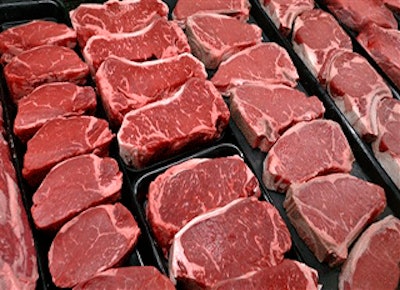
PARIS (AP) — Bacon, hot dogs and cold cuts are under fire: The World Health Organization threw its global weight behind years of experts' warnings and declared Monday that processed meats raise the risk of colon and stomach cancer and that red meat is probably harmful, too.
Meat producers are angry, vegetarians are feeling vindicated, and cancer experts are welcoming the most comprehensive pronouncement yet on the relation between our modern meat-eating lifestyles and cancer.
The WHO's International Agency for Research on Cancer in Lyon, France, analyzed decades of research and for the first time put processed meats in the same danger category as smoking or asbestos. That doesn't mean salami is as bad as cigarettes, only that there's a confirmed link to cancer. And even then, the risk is small.
The results aren't that shocking in the U.S., where many parents fret over chemicals in cured meats and the American Cancer Society has long cautioned against eating too much steak and deli.
But the U.N. agency's findings could shake up public health attitudes elsewhere, such as European countries where sausages are savored and smoked ham is a national delicacy.
And they could hurt the American meat industry, which is arguing vigorously against linking their products with cancer, contending that the disease involves a number of lifestyle and environmental factors.
While U.S. rates of colon cancer have been declining, it is the No. 2 cancer for women worldwide and No. 3 for men, according to the WHO.
A group of 22 scientists from the IARC evaluated more than 800 studies from several continents about meat and cancer. The studies looked at more than a dozen types of cancer in populations with diverse diets over the past 20 years.
Based on that analysis, the IARC classified processed meat as "carcinogenic to humans," noting links in particular to colon cancer. It said red meat contains some important nutrients, but still labeled it "probably carcinogenic," with links to colon, prostate and pancreatic cancers.
The agency made no specific dietary recommendations and said it did not have enough data to define how much processed meat is too dangerous. But it said the risk rises with the amount consumed.
An analysis of 10 of the studies suggested that a 50-gram portion of processed meat daily — or about 1.75 ounces — increases the risk of colorectal cancer over a lifetime by about 18 percent.
An ounce and three-quarters is roughly equivalent to a hot dog or a few slices of bologna, though it depends on how thinly it is sliced.
Overall, the lifetime risk of developing colorectal cancer in the U.S. is about 1 in 20, or 5 percent, according to the cancer society. By the WHO's calculations, having a cold-cut sandwich every day would only raise that to around 6 percent.
Experts have long warned of the dangers of certain chemicals used to cure meat, such as nitrites and nitrates, which the body converts into cancer-causing compounds. It is also known that grilling or smoking meat can create suspected carcinogens.
"For an individual, the risk of developing colorectal cancer because of their consumption of processed meat remains small, but this risk increases with the amount of meat consumed," Dr. Kurt Straif of the IARC said in a statement. "In view of the large number of people who consume processed meat, the global impact on cancer incidence is of public health importance."
The cancer agency noted research by the Global Burden of Disease Project suggesting that 34,000 cancer deaths per year worldwide are linked to diets heavy in processed meat. That compared with 1 million deaths a year linked to smoking, 600,000 a year to alcohol consumption and 200,000 a year to air pollution.
Doctors in rich countries especially have long counseled against eating lots of red or processed meat — and not just because of the cancer danger but because of the heart risks from the saturated fat and sodium.
The WHO researchers defined processed meat as anything transformed to improve its flavor or preserve it, including sausages, beef jerky and anything smoked. They defined red meat to include beef, veal, pork, lamb, mutton, horse and goat.
The report said grilling, pan-frying or other high-temperature methods of cooking red meat produce the highest amounts of chemicals suspected of causing cancer.
"This is an important step in helping individuals make healthier dietary choices to reduce their risk of colorectal cancer in particular," said Susan Gapstur of the American Cancer Society, which has recommended limiting red and processed meat intake since 2002, and suggests choosing fish or poultry or cooking red meat at low temperatures.
The North American Meat Institute argued in a statement that "cancer is a complex disease not caused by single foods."
Independent experts stressed that the WHO findings should be kept in perspective.
"Three cigarettes per day increases the risk of lung cancer sixfold," or 500 percent, compared with the 18 percent from eating a couple slices of bologna a day, said Gunter Kuhnle, a food nutrition scientist at the University of Reading.
"This is still very relevant from a public health point of view, as there are more than 30,000 new cases per year" of colon cancer, he said. "But it should not be used for scaremongering."






















